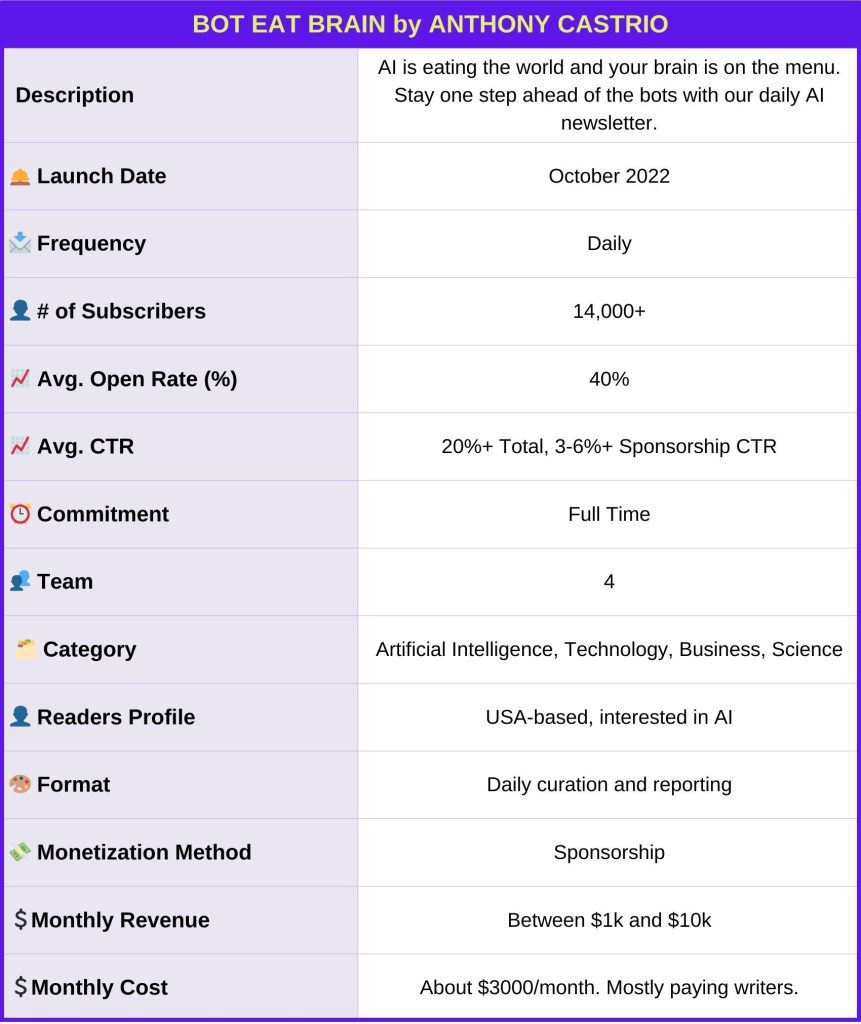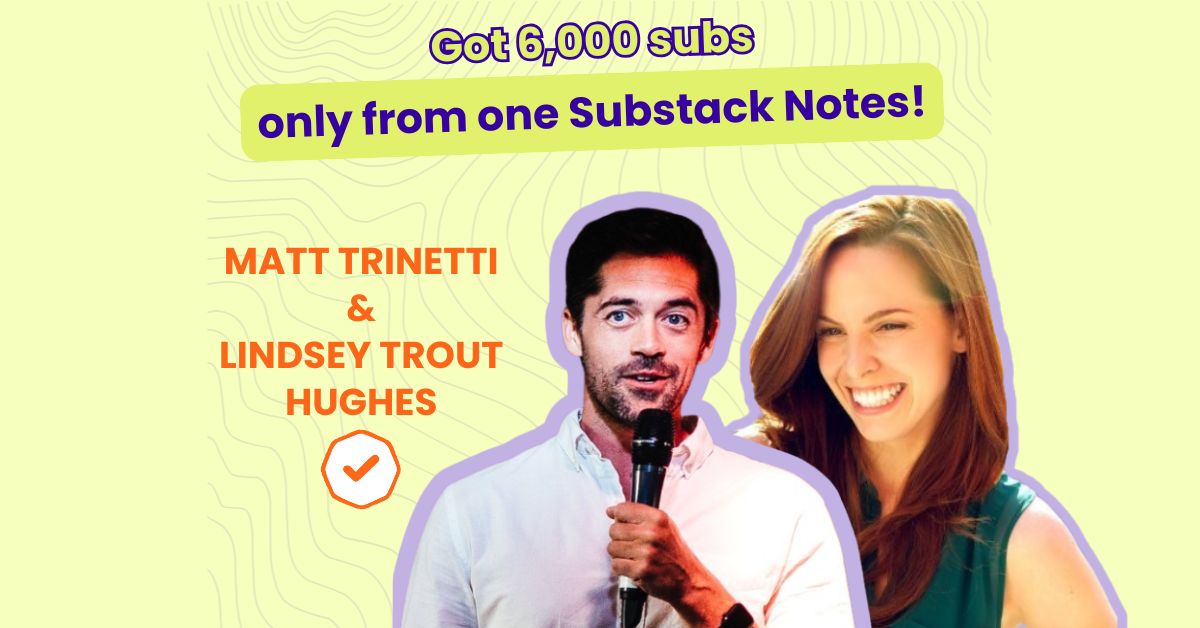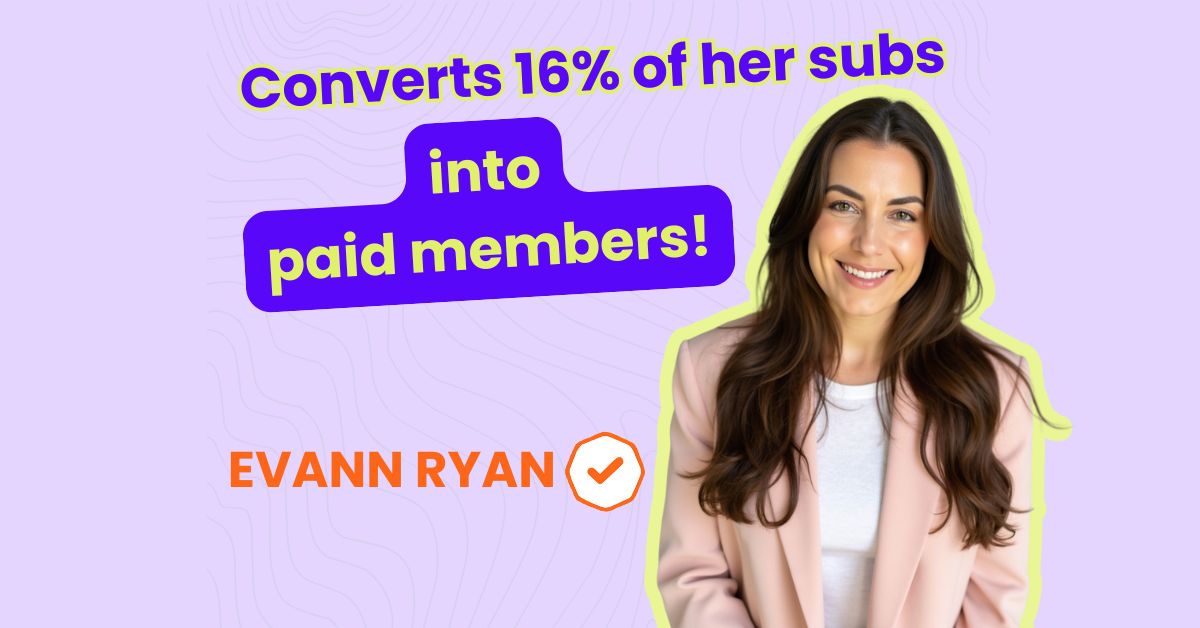Interview Date: June 25, 2023
Table of Content
CREATOR INTERVIEW
We all know that AI newsletters are on the rise and there are way too many newsletters with different sizes.
Most disappeared because it is easy to start with hype but difficult to create a sustainable business.
Today’s creator Anthony Castrio is a special example showing the importance of approaching a newsletter as a real business rather than a weekend hobby if you’re serious about growing and making money.
He started his daily AI newsletter “Bot Eat Brain” in Oct’22.
He cleverly ran a “$5 ad campaign” and attracted sponsors.
He sold 20% of his newsletter for $10,000 in Mar’23.
Currently, he reaches 14,000+ subscribers, generates $1,000 – $10,000 monthly revenue and continues growing mainly by leveraging Facebook ads successfully.
Some of you may also know him from Indie Worldwide – the community he builds for bootstrapped startup founders.
And he says, after 5 years as a nomadic indie maker, he’s still on the road, trying to figure things out.
A lot to talk about, huh? Let’s dive in!
NEWSLETTER IDENTITY CARD

TOOL STACK
- ESP & Writing → Beehiiv
- Note-taking → Discord
- Communication → Discord
- Design → TeamTown
- Sponsorship → Passionfroot
MEET THE CREATOR
Welcome Anthony. Let’s start with getting to know you.
I’m a nomadic indie maker and bootstrapped startup founder.
I started down the traditional path of going to college, getting a degree in Computer Science, and then moving to San Francisco to work at a tech startup, but I quickly de-railed from there into freelance software development and indie hacking.
“Five years later I’m still on the road, still building projects, and still trying to figure this whole thing out.
Currently building two businesses, Indie Worldwide – a community for bootstrapped startup founders, and Bot Eat Brain – a daily newsletter about AI.”

You are an indie hacker leading multiple projects and a vast community. What are the biggest challenges and rewards of being an indie hacker?
“The biggest risk is running out of money.“
Product-led founders make great products but are bad at charging money. Marketing-led founders are great at making a little bit of money but are bad at making products. Sometimes I feel like I try to be both founder archetypes and end up being bad at both. My biggest challenge now is learning how to effectively build a team and delegate the parts I’m not good at.
“The biggest reward is freedom.”
I think most people going down this path are driven by a desire for freedom.
START
What is Bot Eat Brain all about?

Bot Eat Brain is a daily newsletter about Artificial Intelligence. Each issue covers the latest headlines, startup news, and new research.
Our goal is to bridge the gap between people who are interested in how AI is changing the world and their lives and the people who understand and are creating those changes.
Why and how did you decide to start Bot Eat Brain in the first place?
I was lying in bed late one night in Lisbon in 2022 with insomnia because of the massive FOMO I was feeling about the AI space. DALL•E had just been released and was absolutely blowing people’s minds. I’d always had an interest in AI but had been working on other things. It felt like if I didn’t do something right away, I’d totally miss the boat. So I started Bot Eat Brain in order to make sense of what the heck was going on. My theory was that other people would probably feel the same way and appreciate and daily summary.
GROWTH
How did you gain your first 1000 subscribers?
It took me a long time. Way longer than I thought it would.
“The first 50 or so came from reaching out to people on X and asking them to be beta readers. Then next 900 came through a combination of trading shoutouts with other newsletters and talking about the newsletter on X.”
You sold 20% of your newsletter at the end of March for $10,000. Why did you make this decision? How did you make the valuation?

By the time I sold part of the newsletter, I’d figured out a paid growth strategy that was working. I had a really clear path to turn $10k into 10,000 additional readers, but I had pretty much run out of capital to do the investment myself without massive risk.
However, I didn’t actually have any plan to accept investment. But an old friend from college reached out to me and was interested in buying a piece. It took me a couple of days to decide, but since I had such an obvious way to deploy the capital, it seemed like a no-brainer.
“We negotiated a price based on the current size of the newsletter (about 1,000 readers), the rate of growth, and the opportunity.”
What is the most effective growth strategy currently?
Now, Facebook ads are number 1 for us.
What is the main metric you track for the ads?
The main metric we track is CPA. Our target CPA is $2 or less.
What is your biggest learning on how to improve the conversion rate?
Our best ad was written by my mentor in the space. I’m still learning how to create ads that convert myself.
“The biggest learning so far is to try to make your ad look as much like native content as possible. People don’t like ads that looks like ads.”
What are your plans to continue growing?
Focus more on SEO.
Build a great team.
Develop tools that make our job easier.
Try and write the best possible newsletter every single day.
MONETIZATION
How do you make money with your newsletter?
We make money through ads.
Currently, at 14,000 readers, we charge $250 per ad. If we sell all our ad slots, we’ll make about $4000 per month (factoring in bulk discounts).
TBD if we sell out this coming month or not. February, March, and April all sold out completely.
How do you find sponsors and manage the process?
Most find me via X, cold outreach, or from the Indie Worldwide community.
I use a tool called Passionfroot to manage the sponsorship deals. It’s great. Passionfroot does everything except sell my ads for me: booking, calendar management, billing, and asset collection.

Can you also take us through your ad pricing strategy from the early days to today?
“I started by pricing my ads as low as possible. This helped build up hype and momentum.
It also forced me to commit to a consistent publishing schedule, which I’d really struggled with until that point.”
We sold our first ad in January, I believe, for maybe $50. I launched the $5 ad campaign in February.

After our available ads sold out, I doubled our prices.
We sold out again. So I doubled our prices again and opened some new slots.
We sold out again. So I doubled our prices again.
I just kept increasing the price until we reached themarket price, which is typically anywhere between $10 and $60 CPM for a newsletter.
E-MAIL SERVICE PROVIDER
Why did you choose Beehiiv? Pros and cons?
I chose Beehiiv because it’s what Milk Road used. I’d been listening to a lot of the My First Million Podcast and based our initial strategy on Shaan Puri’s business model. Actually hit him up in a DM when we launched but did not get a response.
Now, that I’ve been using it for a while, I can see exactly why they’re winning.
“It’s a great product. Easiest platform by far to launch a newsletter business on and the analytics are unbeatable.”
SYSTEM & PRODUCTIVITY
How do you find writers and ensure the quality of daily content?
I found writers through Indie Worldwide, Reddit, and Upwork. I spend a lot of time coaching and critiquing our writing team to get the best out of them. There is always room for improvement.
Currently, we have a team of 3 writers, an editor, and myself. Dan, the investor, has now become our editor-in-chief as well.
“We have a very detailed template of best practices that helps guide our writers to create great content.”
How do you manage your time?
The first thing I do each morning is check the status of the newsletter. Is it ready for publish?
The second thing I do each morning is check our growth stats, our paid ad performance, and other growth channels.
I also spend time every day answering emails from our readers.
The afternoon varies daily.
NEWSLETTER EXPERIENCE
How did writing Bot Eat Brain contribute to your life professionally & personally?
It taught me a ton about the newsletter business. I’ve also learned a lot about building and managing a team.
The biggest change for me is that this is the first business I truly feel like I’m working “on” more than “in”. I get to really think about it as an entrepreneur vs. as a solo creator. I like that.
What is the most challenging part of writing a newsletter and how do you handle it?
Quality control.
Every day has to be great. It’s a constant challenge to make sure we’re covering the most important stories, seeing the big picture, and extracting insights our readers will find valuable.
RECOMMENDATIONS
What would it be if you had the right to give one piece of advice to aspiring newsletter creators?
Pick a cadence you can stick to and find a way to hold yourself accountable to that pace.
Understand why you’re writing this newsletter because that will vastly change your approach.
A daily newsletter business is very very different from an occasional personal newsletter or a weekly community update.
What are your favorite newsletters that you can’t wait for the next issue?
Bot Eat Brain is number one. That’s my favorite newsletter in my inbox and I don’t read many others currently.
Where to find Anthony Castrio and his work
Subscribe to Bot Eat Brain Newsletter


